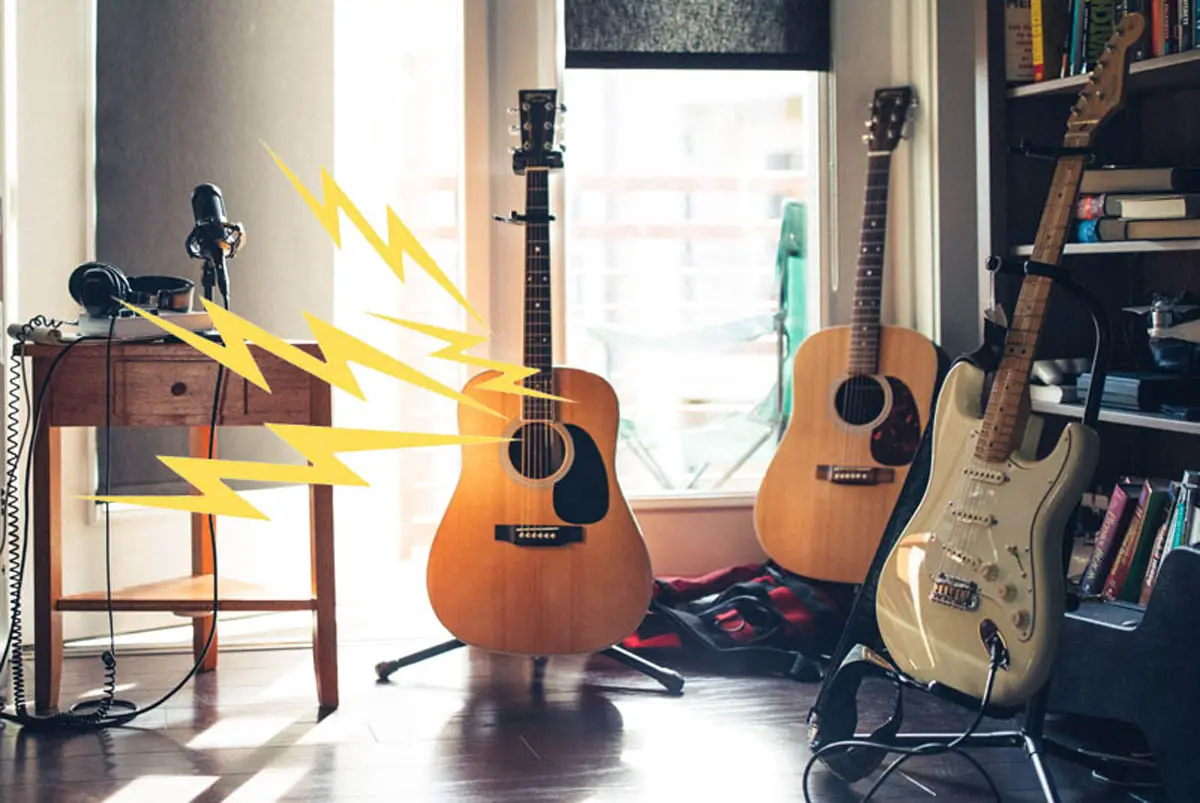Is Acoustic Guitar Too Loud For Apartment Playing?
Acoustic guitars can be pretty loud, and If you live in an apartment you might have heard a guitar being played in another room, maybe down the hallway or through the walls.
For people who love hearing music this might be fine during the daytime, but for someone needing a quiet place to concentrate or sleep it could become a problem, particularly at night.
Chances are you appreciate your neighbors respecting your need for peace and quiet, so it makes sense to consider their needs in return.
Acoustic guitars can be played loudly or softly. If you strum hard the sound can travel through apartment walls, and could be too loud for your neighbors during late nights or early mornings. If your apartment has a high Sound Transmission Class(STC) Rating (60+) your guitar should be only faintly heard in other rooms.

Let’s take a look at how loud acoustic guitars are, how far the sound will travel in an apartment building, and ways to play your guitar that don’t blast your neighbors and roomies with your favorite power chords!
How Loud Are Acoustic Guitars?
Acoustic guitars can be very loud, especially if they are a large dreadnought or jumbo guitar, and even heavier gauge (thicker) strings can make them louder.
Some of the world’s loudest guitars can reach around 100dB – which is as loud as a lawnmower, motorcycle, or snowmobile!
Most acoustic guitars played normally would be more around 70-80dB, equivalent to the sound made by a garbage disposal, hairdryer, or an alarm clock.
Playing softly might be more around 55-65dB, which is similar to normal conversation volume.
What Type Of Apartment Do You Live In?
One thing to keep in mind is how old the apartments are that you live in, and how easily sound travels from one room to another.
Some apartment blocks have tiled hallways or concrete stairwells that cause sound to travel easily around the building, where others have carpet that helps reduces noise.
Can You Easily Hear Noise From Other Apartments?
There is something called the Sound Transmission Class (STC) Rating, which rates buildings on their effective soundproofing.
You may be able to find out the STC rating for your building, and this helps give an idea of how loud you can play your guitar before it disturbs others.
Ideally your apartment would have a rating of 50 or more, check out the cart below to get an idea of what this STC number actually means:
| STC | What Can Be Heard |
|---|---|
| 40 | Loud speech (around 70-75dB) can be heard, but not understood. |
| 45 | The threshold at which privacy begins. |
| 50 | Loud sounds can be heard, but are very faint. |
| 60+ | At this level, good soundproofing begins. Neighbors generally are not disturbed by very loud speech from inside. |
The noise you hear daily from other apartments will help guide you, and if you can hear someone’s loud TV, then chances are they will also hear your loud guitar!
Most apartments list ‘quiet hours’ and it’s best to play more quietly during those times when there is less external noise.
Generally laws state that you can legally make noise from 7am to 10pm weekdays, and from 8-9am on weekends, but if you want to live in harmony with your neighbors you might want to take extra precautions.
Do Your Neighbors Mind? …Ask Them!
If people near you work nightshift and need to sleep during the day, it’s good to know about it, and if the tables were turned you would appreciate them respecting you in the same way.
Sometimes even if neighbors can hear your guitar it’s not loud enough to annoy them, and some music lovers really like hearing music – so just ask and it will help you work out how loud is too loud.
Keep in mind that in the middle of the day there is much more external noise than during the night, so you can probably play quite loudly in the daytime without causing too much stress to your neighbors.
How To Make An Acoustic Guitar Quieter
There are a few ways you can make your guitar sound quieter when playing in your apartment, and this can be the way you play (the techniques you use), or objects that help dampen the sound of the guitar.
1. Soft Strumming
By gently strumming your guitar with the fleshy part of your thumb, the sound will be much quieter.
With a little practice you will learn to control the volume to a level where you might not hear the sound through a closed door.
2. Finger Picking and Palm Muting
You can play softly by using the soft part of your fingers to pick the strings, and it will be much quieter than using your fingernails.
A more advanced technique is to gently rest the pinky-side of you palm gently on the strings while you strum, which will mute the strings.
This can be a little tricky, as too much pressure stops the strings vibrating at all, so you will need to practice to find out what works best for you.
3. Where You Strike the Strings
You can change the tone of the sound according to where you pick or strum the stings.
You will get a sharper tone near the bridge and a softer more mellow tone closer to the fretboard.
Strumming or fingerpicking at the edge of the soundhole near the fretboard will give you a softer sound.
4. The Strings You Use
Old strings may sound more dull than new strings, and often give the perception of not being as loud as new strings.
You can also use lighter gauge strings, as they do not transfer so much vibration into the guitars body, and so will sound a little quieter.
Keep in mind that you may need to adjust a guitars truss rod in the neck if you decide to change the gauge of the strings to a lighter set.
5. Devices And Objects To Mute Guitars
Acoustic guitars can be made quieter by stopping the body from vibrating freely.
If you don’t want to spend any money, you can get some soft foam or some old clothing and stuff it inside your guitar to make it quieter.
You don’t need to fill the whole guitar body, so just experiment to find what works best. You can just slacken the strings without removing them, which gives you enough room to get the damping materials in through the soundhole.
In music shops you can buy a silicone rubber disc that fits in the soundhole, known as a soundhole cover.
They are more designed to stop feedback when playing with an amplifier, but also work well to make acoustic guitars quieter.
You can also buy a foam rubber string damper that sits under the strings near the bridge to stop excessive string vibration.
Wrap-Up
Answering if acoustic guitars are too loud for apartments is not always straight-forward. There can be many variables such as how loud you play, how well your apartments are soundproofed, and what the needs of nearby tenants are.
- You can play loud by strumming hard and using a pick, or play softly using the fleshy soft parts of your fingers and thumb.
- Acoustic guitars can be made a little quieter with damping materials in the body or on the strings, or by the techniques you use to play them.
- You should now have some ideas on how loud is too loud to play your guitar in your apartment, and how to tame it down when needed.
Sources
https://www.nolo.com/legal-encyclopedia/neighbors-noise-faq.html






